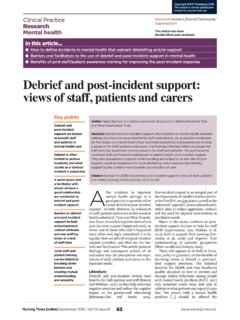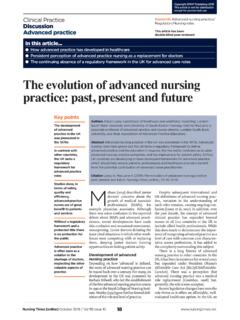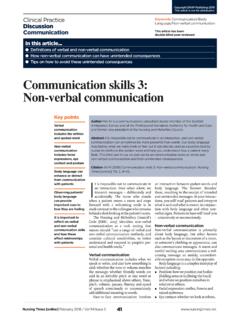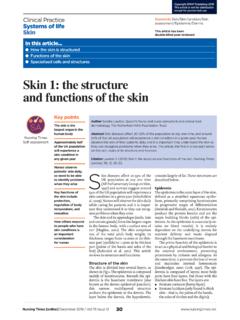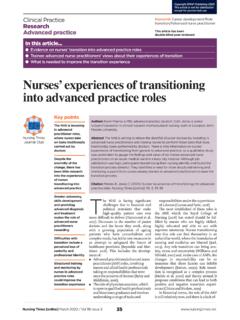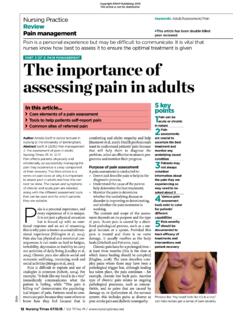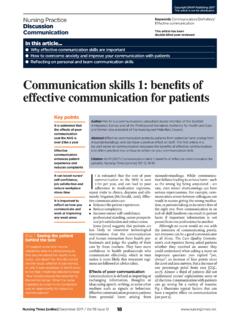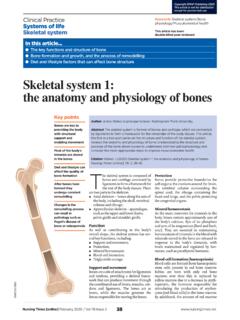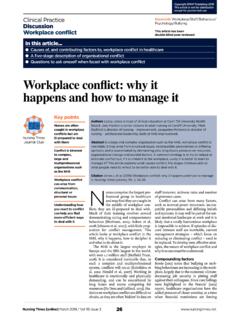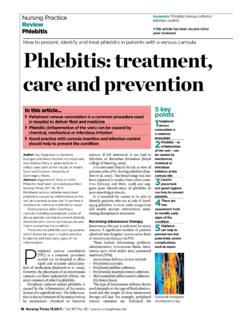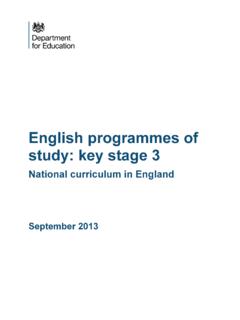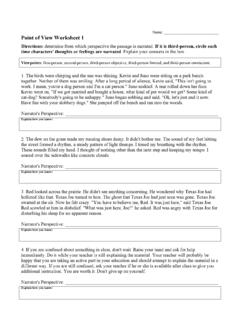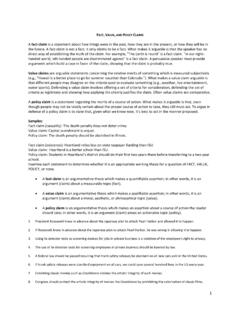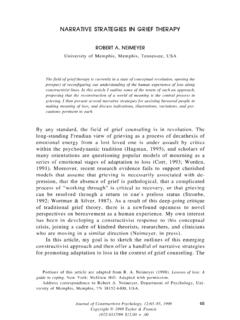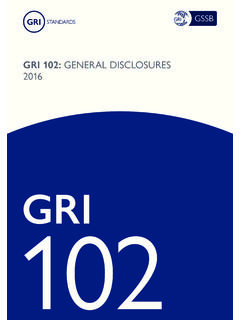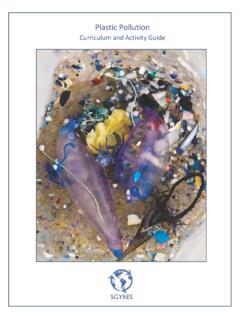Transcription of Identifying and defining research questions - EMAP
1 16 Nursing Times / Vol 112 No 3/4 / : Clinical research /Education/ research question /Topic This article has been double-blind peer reviewedAuthor Raouf Khodabux is senior lecturer, module leader for Approaches to Health and Social Care research , Middlesex University, LondonAbstract Khodabux R (2015) Identifying and defining research questions . Nursing Times; 112: 3/4, 16-19 research is vital to improving nursing practice and patient outcomes, and therefore a key aspect of nursing degree programmes. All student nurses must show they can undertake an independent learning project before they can graduate and become registered nurses. This article outlines processes that can be followed to select a research area and narrow it down to generate a specific research question . Methodologies and models can then be used to compile a list of search terms that can be used to get the research 2011, pre-registration education in England became an all-degree pro-gramme (Nursing and Midwifery Council, 2010), so student nurses in their final year must carry out an inde-pendent learning project.
2 In addition, many qualified nurses are returning to university to do their dissertation and complete their degree (Aveyard, 2014). These projects vary in scope and nature, from literature reviews or extended essays to small research projects. For many students, the dissertation is a nightmare they have to endure to gain a degree (Lundgren and Halvarsson, 2009). This module can be challenging for a number of reasons such as: The requirement to be on placement; Long days and/or night duty; Working part-time to make ends meet; Family commitments. 5 key points 1 Students must complete an independent learning project as part of their nursing degree2 Before conducting research , students must have some knowledge of research process and methodologies 3 Many issues encountered in clinical practice form the basis of research projects 4 Once a broad topic has been selected, it should be narrowed down until a specific research question has been framed 5 research models can help generate relevant search terms from a research questionHowever, perhaps the biggest challenge is the fact that this is an independent module in which a lot depends on students motivation and willingness they have to determine the focus and direction of their work.
3 This is usually carried out on an indi-vidual basis, although some tutor support, supervision and direction is provided. The module is also demanding because there is typically a substantial research component to the project requiring pri-mary data to be collected and secondary or existing data to be analysed. Furthermore, students are expected to have a more pro-longed engagement with the chosen sub-ject than they do with standard course-work, such as essays or reports; the work is consequently required to be more in-depth than students are accustomed to (Todd et al, 2004).Many students struggle to start their project because they simply do not know where to begin. The most critical question for many is What should I study? Deciding between a research project and a literature review depends on the type of degree course being undertaken.
4 However, for most undergraduate nursing courses, students are required to carry out a litera-ture and Lampard (2002) stated that curiosity is, or at least should be, the driving force behind the conduct of any research . research questions are an attempt to tame curiosity, so they are not asked in a haphazard manner but in rela-tion to what is already known about the topic of interest (White 2013). The process of framing, developing and refining these questions allows researchers to make con-nections with existing theories and pre-vious empirical findings; this helps avoid In this How to choose the subject of your research Deciding on a relevant research question Generating applicable search terms and key wordsSuccessful clinical research depends on a properly constructed research question on a topic that is relevant for study.
5 Discover the best process of developing oneIdentifying and defining research questionsMany nursing students do not know where to begin with their research projectNursing PracticeDiscussionClinical researchCopyright EMAP Publishing 2015 This article is not for / Vol 112 No 3/4 / Nursing Times 17the literature on a particular topic, you may find new ideas are recommended for further investigation. For example, there may be observational studies that explain what is happening but not necessarily why. When reading the literature it is useful to bear in mind that: It is possible to replicate a study this not only ensures its reliability but also provides additional information; Any recommendations made at the end of research articles may be followed up with another investigation; Sometimes there may be flaws in the original method used in a study, and the same question can be asked in a different way this may then rein-force or challenge the findings of the earlier concepts that may be tested in practice are the second major source of research questions .
6 Theories such as the promotion of continence and self-care as a framework for nursing or mentorship, and student nurses performance, can be tested in practice. An example of a theory is: Pro-motion of continence will result in better quality of life for patients . Like many other theories in nursing, this can be inves-tigated inductively or deductively. A quan-titative experimental design uses deductive reasoning to arrive at a testable hypothesis. According to Coates (2011), this approach focuses on replicability, objectivity, predic-tion and control; the distinguishing fea-ture is a collection of numerical data that can be subjected to statistical analysis. Qualitative research designs use inductive reasoning to propose a research statement about how people interpret and structure their lives. This kind of research is used to explore, understand and interpret experi-ences, feelings and beliefs (Gelling, 2015).
7 ExperienceResearch ideas can also stem from experi-ence in clinical areas where nurses observe practice that may be a source of concern or simply interest . The research question need not be about something that is wrong but something that could be done better or has not been thought about before. Student nurses are taught critical analysis to encourage them to ask: Why is this being done in this particular way? What will happen if this is done differ-ently? These are important ways to explore more about nursing inductively as they stem from the real world of nursing. Ionesco (1969) stated that it is not the answer that enlightens, but the question . According to Graziano and Raulin (2004): questions are everywhere; all you have to do is observe and be curious . To carry out a literature review, it is nec-essary to: Have a basic knowledge of research pro-cesses and methodologies; Understand the origins of the evidence, primary and secondary sources; Understand the terminology used; Know how the various types of litera-ture reviews vary (Conner, 2014).
8 It is well documented that student nurses tend to disengage with the research module (Ax and Kincade, 2001). Under-graduates find research boring, and may have difficulty understanding the lan-guage and experience cognitive shutdown (Porter et al, 2006); this may come back to haunt them in the final year when they attempt the literature review for their dis-sertation. Since the literature review is an integral part of the research process, it is crucial for students to engage with the research module. Choosing a research topicThe starting point for any research project begins with the choice of topic. This should be a subject the student finds inter-esting, stimulating and worthwhile, as this will make the process more enjoyable and, ultimately, more rewarding. While the initial topic selected may be broad, it must be narrowed down to a focused ques-tion (Playle, 2000).
9 The topic should already have been researched by others so it is possible to search for relevant literature to review. The most interesting topic in the world will not create a successful literature review if nothing has previously been written about it. Sometimes it is a good idea to come up with a few alternative ideas and carry out some preliminary research on each that way, if there has only been limited explora-tion of the first choice, there is an alterna-tive to fall back on. Most research projects start with an idea that arises from clinical practice (Gel-ling, 2015). However, it is generally agreed that research topics narrowed into focused questions arise from three basic sources: The literature; A theory; Experience (Springett and Campbell, 2006).Using the literatureSometimes studies raise far more ques-tions than they answer so, when reading unnecessary repetition of, or overlap with, previous work (White, 2009).
10 In the final analysis, a researchable question is an uncertainty about a problem that can be challenged, examined and analysed to pro-vide useful information (Ellis, 2013). A clearly defined research problem is the fuel that drives the scientific process, and is the foundation of any research method and experimental design, from true experi-ment to case study (Shuttleworth 2008).Framework for a literature review Formulation of a research -focused ques-tion underpins any type of literature review, whether it is for a: Dissertation for a systematic or tradi-tional/ narrative review; Primary research project; research literature review is an account of what has been published on a topic by accredited scholars and researchers. It is an objective, thorough summary and crit-ical analysis of the relevant available research and non- research literature on the topic being studied (Hart 2012).
